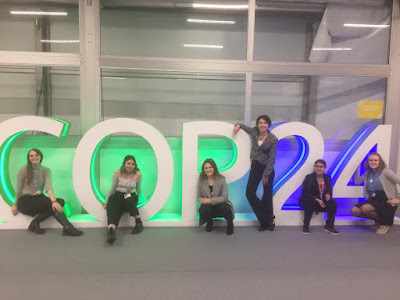A Growing Movement
During this first week, I have been following the topic of agriculture and how it relates to biodiversity. What I found went far beyond mono-cropping and industrial farming impacts. I found a group of small and corporate farmers alike advocating for action within their industry. These citizens from all around the world - from South Africa to Brussels, from England to South America - have come together to not only make agriculture emissions a more prevalent topic in UNFCCC discussions but also to make changes now in the oldest industry in the world. To give a little perspective, the most famous two contributors to climate change are heat and electricity at 24.6% of the contribution of carbon dioxide, and transportation at 13.5% of the total carbon dioxide. However, there is another contributor to the change in climate that is often never talked about, and that is agriculture. Alone agriculture ties with transportation at 14%, and when land use is added at 20.8%, it rivals the electricity and manufacturing industries. With that, agriculture is responsible for the majority of emissions of methane, a greenhouse gas that is twice as effective at retaining heat in the atmosphere as carbon dioxide. This means that mitigation plans involving agriculture would be very effective at lowering the rate of atmospheric temperature increase more quickly, however agriculture only accounts for 24% of most mitigation plans. Another reason that agriculture is so important is that food, water, and nutrition security are all vital for adaptation plans, especially in countries that are at the highest risk, yet only 7% of adaptation plans address agriculture. In all, agriculture is a vital issue and solution in the climate change discussion here in Katowice, but also for just about all issues affecting people all around the world today.
A potential success story of local communities creating action occurred in Kenya, where the population of a single county made up of a very arid landscape, dedicated 1% of their annual funding to climate change issues. This small action led to growing native and Commodity tree crops which allows agroforestry to thrive. The growing of trees on farms led to an increase in food and water security, more influence on climate change views in their area, and gave farmers another source of revenue which increased their income security. This example was provided by Mary, who was one of the founders of the project that helped her community become an example for many rural areas, so much so that many counties around them have adopted the same plans as they have. To look at it broadly, the message sent by these citizens is that climate change is not only an issue but the current attitudes and actions by the leaders of UNFCCC and the Parties are not enough. The citizens acknowledge that the industry on all levels is something that is nearly impossible to change overnight, and forcing farmers to do something that they will not see the benefit from is not a solution. They are asking for recognition at this conference. They are asking the leaders of the world to support them in the projects they are already doing and to allow them as a people and as an industry to make changes so that there will be food, water, and nature for those who take up the land in the future.





Comments
Post a Comment